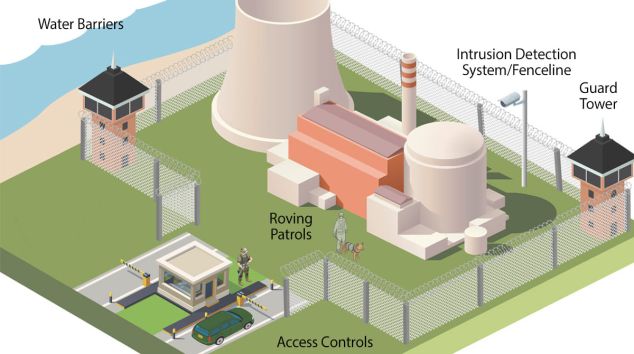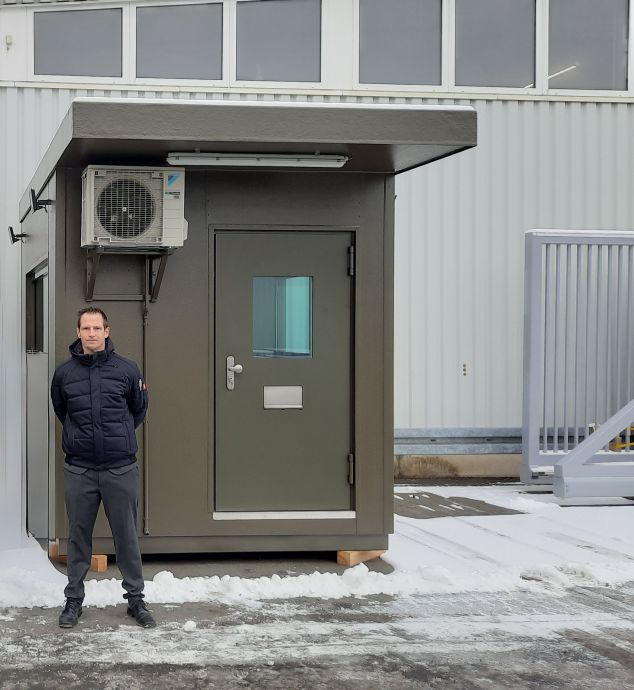Physical protection of nuclear facilities in Ukraine - insights into the work of German-Ukrainian cooperation
When it comes to the requirements for the safe operation of a nuclear power plant (NPP), most people probably think of safety aspects first. For example, natural disasters, human error or technical problems can affect the safety of a nuclear power plant, which is why there are stringent requirements regarding preventive measures for these scenarios.
Safety and security as the cornerstone of nuclear safety
In contrast to safety, security is concerned with protection against intentional malicious acts, with those acts carried out by "third parties", i.e. the respective perpetrators.
Conceivable hazard scenarios in connection with the security of NPPs are, for example
- the theft of radioactive materials,
- the release of radioactivity, for example through deliberate sabotage (insider),
- or the release after theft.
It should be noted that the field of security in the nuclear area is not limited to NPPs (and research reactors). In principle, security issues must be taken into account wherever radioactive materials (including substances that are not nuclear fuels) are handled. This applies e.g. to storage facilities and repositories or applications in the medical field.
Good contacts with supervisory authorities and operators
For NPPs, security first and foremost means preventing unauthorised persons from entering the plant site or exerting any influence on it from outside. Structural and technical measures such as walls, fences, solid gates and doors or so-called access control systems supplemented by personnel measures such as a guarding service have proven their worth for access control. Adapted to modern technical standards and regulatory requirements, they still play a major role in the security of nuclear facilities today. The exact regulations for this differ from country to country, despite there being international standards with basic recommendations.
As in other areas relating to nuclear safety, international exchange is an extremely enriching component of security. Accordingly, GRS has built up and maintained trusting contacts with supervisory authorities and operators abroad over the decades. In this context, GRS also co-operates with a number of Eastern European countries on behalf of the Federal Foreign Office (AA). Colleagues from GRS's Security Department benefit from the exchange of knowledge, while the joint work and financial support from the Federal Foreign Office help to maintain and raise the level of security at foreign facilities.
AA and GRS have been committed to Ukraine for many years
For example, GRS and AA have been supporting Ukraine for many years. With the start of the Russian war of aggression, the urgency of security issues has once again increased significantly. The involvement of nuclear facilities in armed conflicts, such as the capture of the Zaporizhia NPP at the beginning of March 2022, poses unprecedented challenges for the global community.
With regard to security, it is therefore important to consider the aforementioned threat scenarios against which the Ukrainian nuclear power plants must be protected. With the intensified threat situation, the conditions for international cooperation have also changed fundamentally with the start of the war in Ukraine. For example, a project currently being supervised by GRS and financed by the Federal Foreign Office, which aims to improve the physical protection of operating Ukrainian NPPs, does not allow any site visits and restricts direct dialogue.
„The last time we were able to visit our local partners was in the summer of 2021. It is of course frightening to see how the everyday lives of our Ukrainian colleagues have changed since the start of the war, as have our means of keeping in touch. But I think we have adapted quickly to the new situation - everyone involved has done an excellent job here.“
Dr. Stephan Theimer,project manager in charge at GRS
Official go-ahead was given in 2015
The official go-ahead for the Federal Foreign Office's Ukraine projects with GRS was given back in 2015, after Russia annexed Crimea. At an initial meeting, Ukrainian and German representatives jointly assessed the situation and determined which additional measures were necessary and feasible with regard to securing the Ukrainian nuclear power plants.
Eligible measures are planned, projected, procured, transported, implemented on site and maintained together with the partners. The expertise of neighbouring specialist departments within GRS pays off when it comes to carrying out an integrated analysis and assessment. Here, too, there have been links to the countries of the former Soviet Union for decades, which is reflected in in-depth expertise and personal contacts.
This is what the collaboration looks like
A security analysis and assessment is carried out together with the partners in Ukraine, resulting in the identification of so-called hardening and modernisation needs. After determining the eligibility of individual measures, such as access control systems, drive-through protection systems with corresponding customised and robust barriers or video surveillance systems, the tender is issued.
"We visit the potential suppliers together with our Ukrainian partners and assess their performance and suitability before the Ukrainian side makes a decision on this basis," explains project manager Stephan Theimer. (Click here for the full interview.)
Due to the war situation, communication with our Ukrainian colleagues can currently only take place in writing, by telephone, and in the form of video conferences. "That's a shame, of course," says Stephan Theimer, "but our collaboration was characterised by reliability and a friendly relationship even before the war started. This cooperation on an equal footing benefits us all the more now."
„Our collaboration was characterised by reliability and a friendly relationship even before the war started.“
Dr. Stephan Theimer,project manager in charge at GRS
From planning to deployment on site
First of all, the AA authorises the procurement of security equipment. Extensive contractual modalities are then agreed, including import and export regulations. After the equipment-specific design approval from Ukraine, production is started by the respective companies. The preparatory work is now transformed into something tangible - in this way, for example, guard cabins, robust sliding beams or access gates have already been produced in Germany.
Among other things, GRS supports the Ukrainian partners in the shop acceptance testing of the security equipment - the next one is due this quarter. This involves checking whether the agreed specifications have been met. Functional and acceptance tests are also carried out and, in some cases, instructions on how to use the security equipment are provided. The experts from GRS's Security Department usually accompany the installation and commissioning at the nuclear power plant and visit the respective sites. This allows colleagues to contribute their expertise in a supportive manner and, conversely, gain knowledge of the local conditions.
This is not possible in times of war. Acceptance testing is carried out by the Ukrainian partners without any GRS involvement. The equipment is checked for completeness and integrity and in some cases also documented photographically. The Ukrainian partners then set up and implement the equipment in the existing security system.
German guard booths are now installed at Rivne and South Ukraine
Operation, maintenance and care are then the responsibility of the colleagues on site, though: "Of course we also exchange information about how the systems are working, what is going well and what difficulties there may be. The contact doesn't break off, after all, the collaboration is designed for the long term," says project manager Theimer. "German guard cabins are now in place at the Rivne and South Ukraine NPP sites; of course, we also keep an eye on the overall situation, exchange information with our partners very frequently and work together to resolutely tackle new challenges."
„The contact doesn't break off, after all, the collaboration is designed for the long term.“
Dr. Stephan Theimer,project manager in charge at GRS
The scope of the security measures is not rigid and will be adjusted in particular in response to the very dynamic conditions on site. Individual project components such as the construction of a new access control point have been successfully completed. A new biometric-based, anti-counterfeiting access control system has also already been put into operation. Interest in a long-term partnership is high on all sides. Stephan Theimer: "I firmly believe that we will continue to work together with our Ukrainian partners in these difficult times to improve the security of the nuclear facilities - especially as we have the full support of the Federal Foreign Office."

